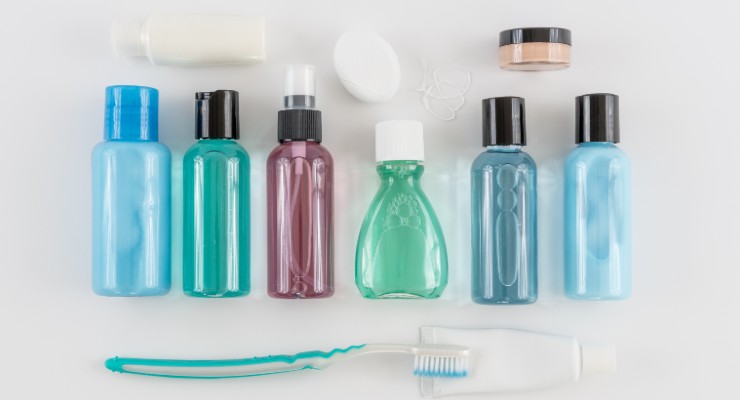01.11.22
The Sustainability Consortium (TSC), alongside P&G, Burt’s Bees, Colgate-Palmolive, GSK, Sustainable Packaging Coalition, The Recycling Partnership, Balcones Resources, University of Arkansas, and Arizona State University have formed a new coalition to accelerate progress on creating resources to recycle small format packaging and other materials through science-based, collective action projects.
This is the first coalition of its kind to include CPG companies, non-profits and universities.
The Ellen MacArthur Foundation (EMF) estimates that 10% of all packaging by weight is small format. Small format is commonly used in cosmetics and food service (e.g., lip balms, compacts, travel size shampoo) but includes items like beverage bottle caps, toys, and other small packaging components which are currently unrecyclable in most curbside recycling programs due to the size of the screens used for sorting within Material Recovery Facilities (MRFs). As a result of these challenges, the majority of small format is going to landfill or has the potential to become litter, rather than being captured as valuable material that can be used in other products and packaging through a more circular path.
Jennifer Park, TSC collective action manager says, “This is an exciting collaboration of corporate, NGO, recycling, and university thought leaders coming together to address a complex issue across the consumer goods industry and communities. The work is already providing important insights into how to improve the circularity of small format.”
“Addressing the recycling of small format packaging, which represents a large proportion of our portfolio, requires a systemic approach. We’re hopeful that this coalition will identify meaningful, scalable solutions,” said Matt Kopac, associate director, Sustainability.
Moving forward, TSC and its partners will lead a coalition to:
This is the first coalition of its kind to include CPG companies, non-profits and universities.
What is Small Format Packaging?
The Association of Plastics Recyclers (APR) defines small format products and packaging as items smaller than 2 inches in two dimensions and has developed related sortability protocols for further testing.The Ellen MacArthur Foundation (EMF) estimates that 10% of all packaging by weight is small format. Small format is commonly used in cosmetics and food service (e.g., lip balms, compacts, travel size shampoo) but includes items like beverage bottle caps, toys, and other small packaging components which are currently unrecyclable in most curbside recycling programs due to the size of the screens used for sorting within Material Recovery Facilities (MRFs). As a result of these challenges, the majority of small format is going to landfill or has the potential to become litter, rather than being captured as valuable material that can be used in other products and packaging through a more circular path.
Jennifer Park, TSC collective action manager says, “This is an exciting collaboration of corporate, NGO, recycling, and university thought leaders coming together to address a complex issue across the consumer goods industry and communities. The work is already providing important insights into how to improve the circularity of small format.”
“Addressing the recycling of small format packaging, which represents a large proportion of our portfolio, requires a systemic approach. We’re hopeful that this coalition will identify meaningful, scalable solutions,” said Matt Kopac, associate director, Sustainability.
Moving forward, TSC and its partners will lead a coalition to:
- Perform a waste characterization study of small format, including a projection of the volume and scale of collection to estimate economic value and
- Model and test MRF secondary sortation technologies and capabilities.


















